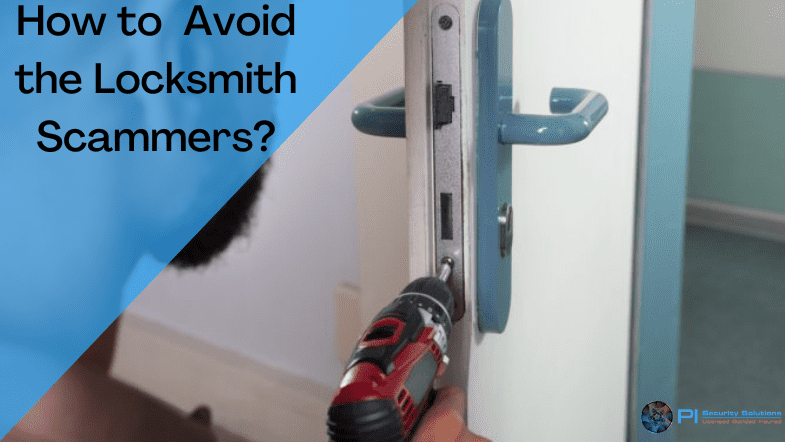Getting locked out of a vehicle or home can virtually give you a panic attack. In your frantic effort to open the door, you try all sorts of things including calling the nearest locksmith or local handyman. Is this a wise idea? What if he scams you?
Locksmith scams are very prevalent in the United States and are often a predominant cause of car thefts or home burglaries. In this circumstance, what are the efforts one must take to avoid a locksmith scam?
Tips that teach you how to avoid locksmith scammers
Ensure he is a legitimate locksmith
Fake locksmiths are everywhere and one way to identify them is by checking their physical addresses. Most shady locksmiths will have fake business listings or copycat locksmith business listings.
One way to ensure that they do exist is by checking their Google MyBusiness Listing. Google takes pains to weed out faux business listings and you can rely on them.
Fraudulent telephone listings
Never believe a toll-free number if it is listed under a locksmith company.
Usually, fraudulent locksmiths will give an 800 number in the place of a toll-free number. Such toll-free numbers are red flags you have to be wary about.
Check reviews
A good customer review is the first indication that the locksmith company is genuine and trustworthy. No legitimate business will ever have bad reviews.
Check the locksmith license
Nearly 15 states in the United States require a compulsory license for a locksmith to operate. So, if your locksmith technician arrives without a professional license, just call law enforcement. Also, check the validity of the license and make sure it is not someone else’s or if it has expired.
Always look for a licensed locksmith as these professionals will always be under the eye of the law. If you find a BBB Accredited Locksmith, it is even better.
Ask for a cost estimate upfront
A professional locksmith company is always willing to give an estimate beforehand of their cost of services. If the company is unwilling to do so, you can be assured that they are scammers who are likely to escalate the costs.
Do some research and find out the exact costs for the locksmith service you need. Compare this with the estimate your locksmith gives and see whether the fluctuation in cost lies.
Request a detailed cost breakdown
Always get a detailed cost breakdown to calculate the actual costs and see if there is a huge variation in the actuals vs. estimates. There are no additional charges that you have to worry about.
A scam locksmith will charge without proof. He might fleece you for service charges, mileage charges, and all kinds of last-minute fees.
Reputable locksmiths will always give an estimate with fair pricing and show no cost deviations on completion of the job.
Get the quote in writing
First-time customers always want to get a cheap quote. They do not realize that the quote might look cheap upfront but will not necessarily be the same on completion of the job. Scammers are likely to beef up the quote with hidden charges.
It is always better to get the quote in writing as you have proof to complain to the Consumer Protection Forum in case of any malpractice.
Get an itemized invoice
An itemized invoice gives you a detailed breakdown of the costs like cost of supplies, labor costs, transport or delivery charges, etc. This helps you to identify whether the discrepancy in costs lies.
Check the locksmith’s vehicle
Every trustworthy locksmith always comes in a company-branded vehicle. If you find the locksmith arriving in a private vehicle without company identification, do not entertain him.
Do not pay until you are satisfied with a job
A skilled locksmith is thoroughly professional and will ask for your written endorsement on the completion of the job. A dedicated locksmith does not hesitate to answer your queries or clarify your doubts.
Ask plenty of questions regarding the locksmith service. If you find that your locksmith is not keen on answering them, you can be sure he is not an experienced locksmith or more likely to be a scammer.
Always use your credit card for payment
Using a credit card is a wise idea as you can track the locksmith’s credentials through his bank account information. You can even revert transactions if you find fake listings.
Learn to recognize scammers and differentiate spam listings from genuine locksmith listings. Always call a reliable locksmith with a good reputation and address online (like Pi Security Solutions) to stay clear of scams.

Pi Security Solutions Owner/Operator Nim Gil is a product of a rigorous apprenticeship and has locksmithing experience from 2012. He possesses the knowledge and technical expertise to work on difficult, unique, and antique locks as well as all modern safe, vault, and lock technologies. He has successfully completed numerous entry control projects in the given time frame. Nim is fully licensed, bonded, and insured. He understands the Safe and Vault Technicians Association (SAVTA) and the Associated Locksmiths of America (ALOA) and works by the standards of these two leading organizations. Nim is also well-versed in state safety codes and other Seattle locksmith requirements.

